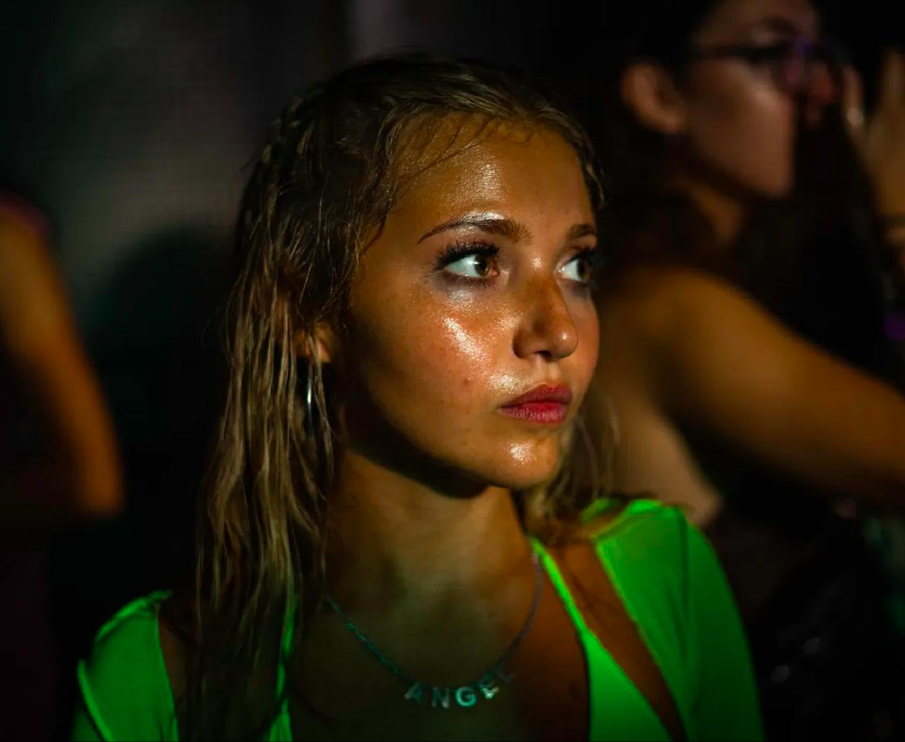By Olivia Howard, Second Year, Geography
Nominated for 13 British Independent Film Awards, including Best Film and Lead Breakthrough Performance for Mia McKenna Bruce (Tara), Molly Manning Walker’s striking debut forms a boldly honest and strikingly relatable exploration of sexual consent, and the ambiguity of assault, sexuality and friendship. Following a group of three sixteen-year-old friends on holiday in Malia, How to Have Sex (2023) is a film in two parts, one initially of escapism, illusion and potential, moving into a sinister exposé of what lies beneath such classic British holidays.
Following their GCSEs, Tara, Em and Skye book their rite of passage holiday to the party town of Malia in Crete, a universal experience for many young people in Britain following exams. With a story of self-discovery embedded within the Malia party scene, this trip is especially important to the central figure Tara, who is hoping to relinquish her title as ‘the virgin’ of the group, a common desire for such hedonistic driven trips. This film follows the loss of innocence many shed around sixteen, and the common yearning for platonic and romantic acceptance.
With an air of inevitable chaos, the three girls stay in a flat opposite another party group, Badger, Paddy and Paige. Tara develops as the lead in the film as she meets the scruffy, bleach-blond-haired Badger with whom chemistry is instant. Paddy is introduced as the ‘well jokes’ mate of Badger, and Paige develops as Em’s Malia fling, a small but underdeveloped representation of the queer community within the film.

As Skye and Paddy become aware of Badger and Tara’s growing connection, their jealousy results in toxic behaviour prying them apart, Skype pressuring Tara to sleep with Paddy, emphatic of how good they would look together. Through Skye, Manning Walker astutely highlights the pressure women place on each other to seek validation and identity through their sexual experiences. Skye’s pointed comments and biting tone towards her ‘best friend’ consistently belittles Tara, putting her down, as she suggests later in the film that all she will be in life is front-of-house staff. Through Skye, Manning Walker displays the female pressures which push Tara into unsolicited situations and the commonality of toxic friendships masked by sweet nothings.
As the film reaches its climax the drumming bass sounds, heavy breath of Tara, McKenna Bruce’s evocative expressions and the hyper-vivid, visceral cinematography within the nightclubs immerse the audience in Tara’s experience of Malia. Shotting vodka and downing bright blue basins of alcohol, a lack of control for Tara feels imminent. The inevitable begins when the protagonist sees Badger with other women, feeling hurt she loses herself in the nightclub and although surrounded by people she has never been more alone, Skye and Em not in sight.
The events which follow are shown in a series of flashbacks throughout the rest of the film; simultaneously evocative and sobering as they reveal Paddy and Tara’s drunk and emotional sex on the empty beach - the encounter lacking clear communication.
The increased pounding of music, flashbacks, and stark daylight scenes of sickening hangovers begin to overload the senses, with the audience giving a small insight into Tara’s emotions. Although the camera stays close to Tara for the rest of the film, we do not see her outwardly grieve or talk about this experience with her friends, bar a brief allusion to Em about the circumstances in which she lost her ‘virginity’ at the end of the film.
Badgers' character is Manning Walker’s way of exposing the enabling friends in these circumstances, as he is unable to support Tara when she needs him the most. The inclusion of Badger’s character is an insight into the importance of this film: it highlights how men need to learn to communicate their feelings and reverse toxic cultures around them, they should not be locked out of difficult conversations otherwise they risk being complicit in such destructive behaviours.

A succinct articulation of violation, and the many forms it can take, How To Have Sex shows but doesn’t tell the tribulations faced by many young women and people around the world. This must-see film shows how young people today are raised without the tools to discuss such issues, with women especially, such as Tara, lacking the vocabulary to articulate what they want from sexual encounters and how they feel about sex to their friends. Manning Walker manages to perfectly capture the adolescent angst many girls have as they transition into womanhood.
The power in this film is its commonplace nature and relatability to many, whichever character they sympathise with. Through the exploration of Tara’s lived experience, How To Have Sex begs for any curriculum and education surrounding sex, consent, relationships and sexuality to be re-addressed. Tara’s sobering tale of a loss of innocence acts as a warning towards how society treats and values sex and friendship.
Featured Image: IMDb
How do you think the education surrounding these issues needs to change?







